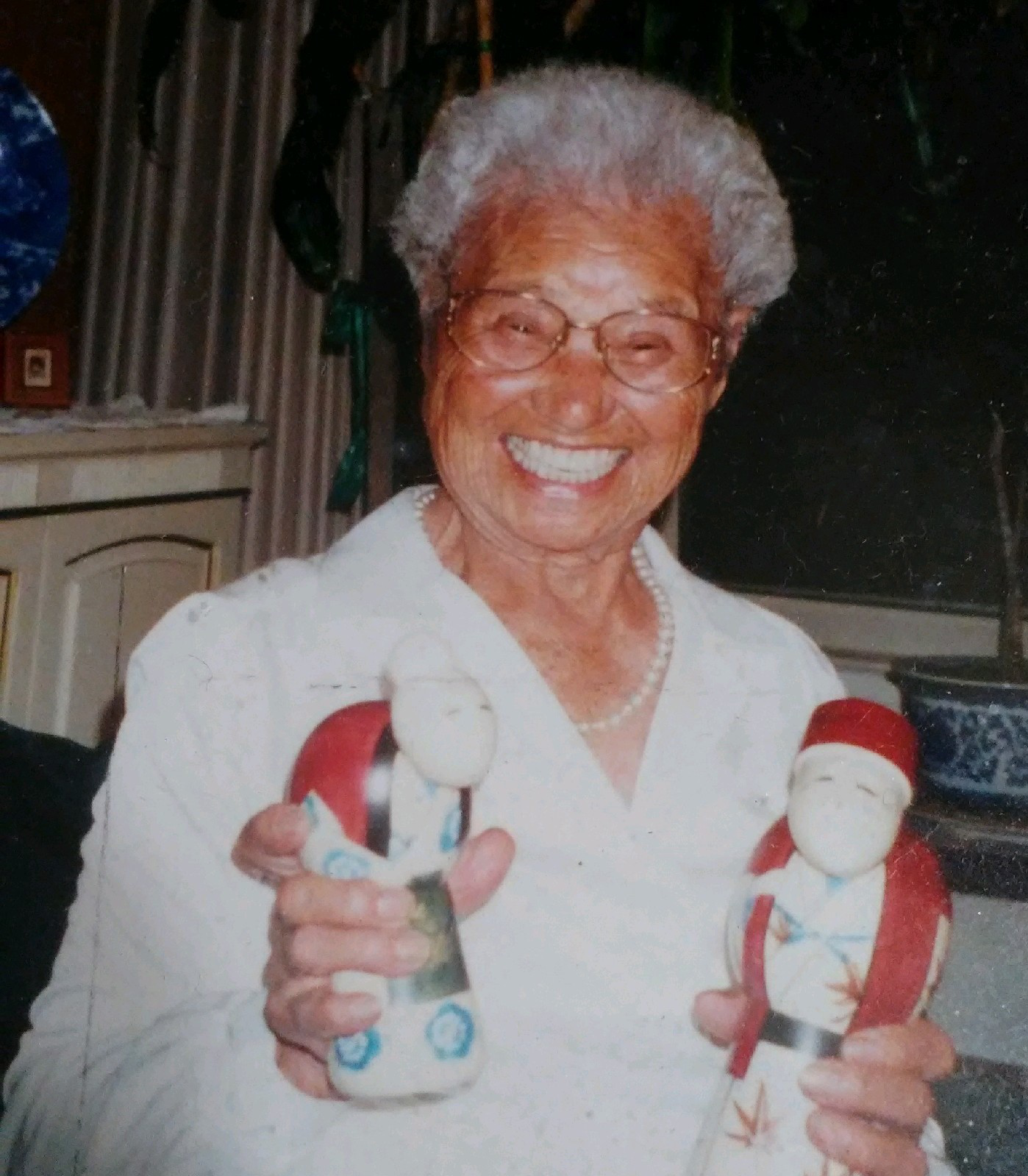Life’s challenge with compassion

Okay, so this is about my mother Toshiya Tanaguchi. She was a senior that would regularly go to Yu-Ai Kai for senior activities and then she began to live in my home after my kids were all grown up and away, and I was able to have a separate bedroom and bathroom for her. I started noticing her getting forgetful around 1994, and one day I found some cheese in the refrigerator and I know both my husband and I didn’t put them there. I found out they were my mother’s, so I asked her, “Why did you put the cheese in the refrigerator?”
So that was the first incident that said there was something wrong and then there were other similar incidents. So I took her to a neurologist and then the neurologist showed me some pictures: one of my mother’s brain and then the other one was a healthy person’s brain. The healthy person’s brain was vivid with different colors like red, yellow, green but parts of my mother’s brain were kind of vacant and gray and dark. The neurologist explained that the gray was cells dying which created memory loss. And so he conducted more tests and he told me my mother had Alzheimer’s/short term memory loss. My mother knew all the while that she was having problems with her memory, and she would say that so she was aware. She would say, “Oh my gosh, my mind is not the same anymore, I can’t remember anything.” But interestingly, the same with all Alzheimer’s patients, she could remember something that happened 70 years ago when she was a young kid with vivid details of exactly what had happened.
My mother was also a walker, she would walk around my neighborhood and she always remembered, even after she was diagnosed with Alzheimer’s, how to get home. But then we found out that she wasn’t able to stand up and walk, and it's harder and harder. She fell once or twice so then my sister who lived out of town, told me that I couldn’t handle her anymore and that I needed to place her in a convalescent hospital. And I thought maybe I could handle my mother for another couple years, but then my sister insisted no because it was getting to the point that my back was getting painful from lifting my mother.
But then we found this hospital that was in walking distance from my brother, not even a block. So then we placed my mother in this centermost convalescent hospital. And I was perturbed because my brother and his wife would not go visit her when they were just in walking distance. Eventually, after my nagging they did finally go visit her. So my mother, while at the convalescent, enjoyed going outside in her wheelchair, and she actually, in my opinion, thrived in that environment because they made sure that she participated in activities like bingo. I thought how could someone with Alzheimer’s play bingo, so I would sit with her to see and she actually would look at the letters ‘B, I, N, G, O,’ and she would look at the numbers and she could actually play bingo. I thought wow, someone who has short-term memory she was still able to play something like bingo. And she was also very happy in her wheelchair, singing in the hallway, no one understood what she was singing because she was always singing in Japanese but they made her very happy.
But then one day, she started to become a little paranoid and she says, “People are stealing things from my room.” and I said, “No, mom, they’re not stealing things,” and she says, “Yes, they are.” She was so emphatic about that but I was told that that was one of the things that Alzheimer’s patients had, was that they’ll start thinking that people are stealing. But actually I went down the hallway, and I found that another patient had stolen one of her items and I thought oh, okay, so here I was telling her nobody stole anything from you when actually it did happen. So towards the end, it was getting to the point that she wouldn’t recognize anybody in the family with the exception of me. That’s because I was there all the time and I was her primary caregiver.
So she finally passed away after being in a convalescent hospital for 4 years and she died in January 2009. And actually a lot of people said, well she lived a lot longer than most patients, they normally live about 2 years in a hospital like that but my mother was able to live for at least 4 years.
So after she passed on, actually before she passed on, I think about a year or 2, before she passed on, I also noticed that my husband was beginning to show signs of dementia and finally I was concerned enough because I had gone through this with my mother. I asked his primary physician to take a look at him and test him, and he says, “No, your husband doesn’t have Alzheimer,” But I insisted that he give him some test so actually Kaiser has a memory clinic, and so we took her to that memory clinic, ran some test, and sure enough, he had the beginning stage of Alzheimer. So when my mother still was living, my husband also was diagnosed with Alzheimer’s. But then my husband’s case, they prescribed Namenda, which was a fairly new pill at the time. It must have helped because he was still in the beginning stage when he passed on.
Now the thing about my husband, unlike my mother, he didn’t like exercise at all, he would just proceed to do walking. She walked all the time and of course, she lived to be 95 but I would force my husband to take short walks just around the block. And he said, “what does this have to do with my memory?” I said, “Well exercise will give oxygen to your brain and that should help you a bit. But then I noticed he started to get very, very, slow and he had a shortness of breath. And so he began, like most patients with dementia, asked me again and again e.g. if I say, “Well I’m sorry Art, but I’m going to a meeting tonight but I’ll be home in two hours.” He would ask me ten times, “Where am I going, where am I going?” And I would ask him something, his response would be, “I don’t know, I don’t know.”
So I think dealing with these two people with Alzheimer’s at that time was very, very difficult. It really does test one’s patience and many times, I had to keep reminding myself, well you know they’re ill. It's an illness, so you know to remind myself, please be more understanding, be more patient. And patients like my husband, my mother, they have good days but they also have bad days. And the good days, it seems as if there was really nothing wrong with him, it seems like they were normal. In fact, one of my brothers-in-law, visited my husband one day and said, “I don’t think Art has dementia at all.” Well that happened to be a good day. The next day, he was back to ill, not knowing anything, keep asking the same questions.
So my husband eventually had pneumonia, and then they discovered, through X-ray, that he had stage 4 lung cancer. So he died within two months in 2012. And around that time, my mother’s two sisters also had dementia. The youngest one had Alzheimer’s and she went very quickly. She didn’t even experience the beginning stage, she went right away to advance stage. And she died in 2017. So then I began to be very nervous, that three sisters had dementia on my mother’s side of the family and so I kept thinking, wow, this might be genetic just like some of these diseases are genetic. And I was trying to just stay very hard to keep myself busy so I wouldn’t become a victim also. So when I look back on those years, I really felt badly at times that I lost my patience and understanding. It also helped that I kept trying to have a balance of my life, still participating in my volunteer work, and doing activities that kept my mind off of my husband’s. And but it did take a lot of toll, it made me very, very, sometimes depressed. And I remembered thinking that it really did take a lot of love and compassion, and a lot of patience to become a caregiver especially those with dementia. I think its harder with someone you love with dementia than it is with someone you love with cancer or heart problems. You know, to me I thought it was easier to deal with those diseases than something mental like Alzheimer’s. So those are my stories about my mother, my husband, and my two aunts.
